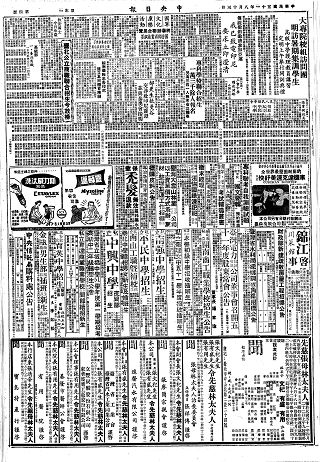Why we “take the trouble of travelling from thousands of miles away.”
Translated by Mpaza Kapembwa.
[Central News Agency dispatch]
There are a lot of foreigners in Taiwan. Among them is a group that is different from the rest–students here studying Chinese either independently or as part of an educational program. I would like to share some of the reasons we foreign students come to Taiwan and some of our impressions of this country. Even if I have been studying here for two years, my experiences do not represent those of other foreign students. While I use “we” throughout this essay, what I am actually referring to are just my own experiences and opinions.
American interest towards China has entered a new phase; one in which Americans wish to deeply understand China and its people. In the past, Americans who had some understanding of China were diplomats, businessmen and women, missionaries, and military personnel. They gained this knowledge passively through their work and daily lives. Chinese learners today include students who seek a deeper understanding of the culture for research or personal interests. Of course, such students existed in the past but recently their numbers have increased each year.
Why do these students think it worth coming all this far to study Chinese culture? Foreign students have become a medium by which their fellow countrymen and women can learn about China. When we go back, we can tell them what China is like and dispel myths about it. But we can only do this if we ourselves first have a deeper understanding of Chinese society. In the process of learning, we encounter many difficulties. I would like to share some of the reasons I think these difficulties arise.
First, American and Chinese culture are very different. We are all products of our environment. Therefore, a person’s behaviour, thoughts, and language are all dictated by the environment he or she grows up in. Because our standards and the way we evaluate behaviour is influenced by our background, we have to be careful not to misunderstand what we encounter. This is just human nature and unavoidable.
When American students try to understand a certain problem in Chinese society, our Chinese friends often think we are criticizing or even looking down on their culture. This is one type of misunderstanding. For example, when Americans ask, “Why do Chinese people build fences around their homes?” This question is not meant to look down on this practice; we asked because we simply noticed something that is different between our two societies, and we would genuinely like to understand why Chinese people build fences around their houses. Because the person asking and the person expected to respond look at this issues from different cultural backgrounds, the answer might proved unsatisfactory and result in unintentional offense.
This makes us feel bad for asking and at a loss for what to do. This can of course happen anywhere in the world. The reasons we came here and are willing to struggle is because we love China and its people.
The second factor I believe hinders our understand is our expectations towards China and Chinese people. These expectations are set by how China is discussed in our country and the explanations and impressions China gives of itself. This leads us to coming to Taiwan with certain prejudices. Most Americans think Chinese people think and behave the way we perceive Confucius and Sun Yat-Sen behaving, just like most American today do not think and behave like the founding fathers or Abraham Lincoln. Some Americans hold such beliefs because that probably learned about Confucian thought and have seen slogan and signs in public (in Taiwan) lauding Confucianism.
When many American students arrive in Taiwan, they think they already understand Chinese culture. When they encounter a Chinese person whose etiquette is very different from what they expected, they become surprised. What this American has just encountered is something he or she never expected given what he or she thought Chinese etiquette ought to be. But guests whose expectations are not met should not offend their hosts.
In the end, when we return to our countries we can stay, at the very least, that we know what we do not know. There are some things that we still won’t be able to completely understand. Our ultimate is to understand, of course; and the reason we want to understand is because we love China and Chinese people.
[ July 11, 1965 / Central Daily News /Page 6]




